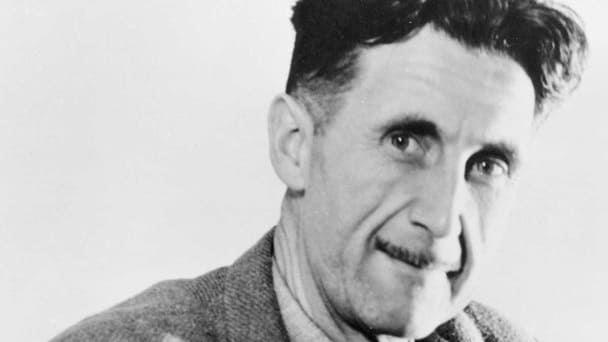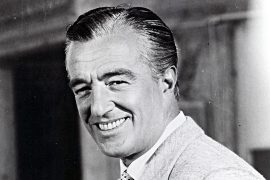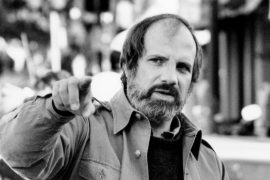The British writer and journalist is one of the most important writers of the first half of the 20th century. His politically engaged essays and novels established his position as a world writer. George Orwell found international recognition with novels such as “The Road to Wigan Pier”, “Show Up for a Breath” or “Animal Farm” from 1945. The anti-utopia and fable are among his central legacies. From the perspective of a microcosm, he satirically portrayed a unique political perspective using animals on a farm. With the chilling novel “1984” he created the scenery of a totalitarian society of the future, which dealt with Nazi Germany and the Soviet Union under the leadership of Stalin…
George Orwell, actually Eric Arthur Blair, was born on January 25, 1903 in Motihari, India.
At the age of eight, his parents urged him to attend the strict elite school Eton. Here he wrote the ironic autobiography “Such, such were the joys”. Orwell then received a scholarship to the renowned Eton College and studied there from 1917 to 1922. After completing his studies, he went to Burma in 1922 as an officer and served there in the “Indian Imperial Police”. In 1927 he resigned in protest against their methods, as he had developed against English imperialism. This was also reflected in his first novels “Burmese Days”, “Shooting an Elephant” and “A Hanging”. The next few years in London and Paris were marked by illness and poverty. After days as a dishwasher and private school teacher, he managed to make a living as a freelance writer. In 1933, Orwell published his debut novel, Down an Out in Paris and London. In it he described his experiences in the hopeless milieu among the homeless. The first work with a political influence appeared in 1934 under the title “Burmese Days”, in which he accused British colonial rule in India and imperialism in general with autobiographical coloring.
In 1936, George Orwell drew level with other politically engaged writers such as Wystan H. Audan or C. Day Lewis and voluntarily joined the Spanish Civil War as a soldier of the republican force. A year later he was seriously injured and had to leave Spain to flee from the communist police. He returned to England. His experiences in Spain found literary processing in 1938 in the title “Homage to Catalonia”. This reflected his deep disappointment with the attitude of the left in Spain and their Stalinist orientation. With the title “The Road to Wigan Per” he took on the description of the inhuman living conditions of the English miners in 1937. During the Second World War he worked for the BBC and was editor-in-chief of the magazine “Tribune”, for which he wrote numerous reports. In 1945 Orwell published the anti-utopia and fable “Animal Farm”, which is one of his most important legacies. From the perspective of a microcosm, Orwell satirically portrayed a unique political perspective through animals on a farm.
From the revolutionary slogan of the animals against their farmer “All animals are equal…” grew out of the new pig rule the addition “…But some animals are more equal than others”. Another literary highlight was his science fiction novel “Nineteen Eight-four” from 1946. His pessimistic view of history was expressed in his novel of the century about a totalitarian world state in which people were deliberately manipulated and monitored and any rebellion was blocked. Based on the Soviet rule and Hitler’s Germany, he created the critical representation of the totalitarian power mechanisms. In the years that followed, “1984” became the epitome of the science fiction novel with philosophical acceptance and undiminished topicality. “Big Brother is watching you” still has its proverbial status in our media age. By this time, Orwell was already suffering from severe lung disease. With works such as “Shooting an Elephant and Other Essays” he was unable to build on his old successes. Orwell destroyed many of his manuscripts during his lifetime. These were therefore never made public.
George Orwell died on January 21, 1950 in London as a result of tuberculosis.
Posthumously, Animal Farm was made into an animated film in 1955. Today, history is an integral part of school curriculum. “1984” was filmed several times. Works such as “Coming up for Air” and “Keep the Aspodostra Flying” also served as the basis for popular literary adaptations.
What was George Orwell famous for?
George Orwell was a novelist, journalist, essayist and critic, best known for his novels Animal Farm (1945) and Nineteen Eighty-Four (1949).
What is George Orwell’s famous quote?
“Reality exists in the human mind, and nowhere else.” “Freedom is the freedom to say that two plus two make four. If that is granted, all else follows.”
Where is George Orwell from?
George Orwell, pseudonym of Eric Arthur Blair, (born June 25, 1903, Motihari, Bengal, India—died January 21, 1950, London, England), English novelist, essayist, and critic famous for his novels Animal Farm (1945) and Nineteen Eighty-four (1949), the latter a profound anti-utopian novel that examines the dangers of …
What was 1984 by George Orwell about?
In George Orwell’s 1984, Winston Smith wrestles with oppression in Oceania, a place where the Party scrutinizes human actions with ever-watchful Big Brother. Defying a ban on individuality, Winston dares to express his thoughts in a diary and pursues a relationship with Julia.
What name did george orwell want on his tombstone?
When Eric Arthur Blair was getting ready to publish his first book, Down and Out in Paris and London, he decided to use a pen name so his family wouldn’t be embarrassed by his time in poverty. He chose the name George Orwell to reflect his love of English tradition and landscape.
Where and when was george orwell born?
Full name: Eric Arthur Blair
Place of birth: Motihari, India
Who was george orwell?
George Orwell was a novelist, essayist and critic best known for his novels Animal Farm and Nineteen Eighty-Four. He was a man of strong opinions who addressed some of the major political movements of his times, including imperialism, fascism and communism.
What did george orwell do in burma?
Fresh out of Eton, George Orwell spent five years in Burma as a policeman in the colonial service. He left in 1927, fed up with “the dirty work of Empire,” but the country never quite left him.





